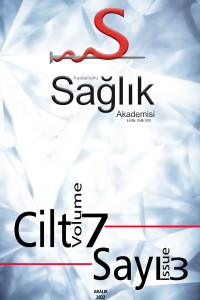Abstract
Kültür, bir grup insan tarafından öğrenilen, paylaşılan, nesilden nesile aktarılan değerler, inançlar, tutum ve davranışlar, örf ve adetler olarak tanımlanmaktadır. Doğum biyolojik bir olay olmasının yanında aynı zamanda sosyal/kültürel bir yaşam deneyimidir. Toplumun geleneksel ve sosyal bir kurumu olan aile, neslin devamını üreme ve doğurganlık işlevi ile yerine getirmektedir. Aile yaşantısının sağlıklı olabilmesinde çocuk sahibi olma toplum içinde önemli bir statü göstergesidir. Çocuk sahibi olamama, stresli ve baş edilebilmesi zor, her iki cinsi duygusal olarak etkileyen, kadınlarda daha fazla stres ve baskıya neden olan bir durumdur. Bu sorunu yaşayan bazı kadınlar tedavi amacıyla geleneksel uygulamalara başvurarak sağlıklarını tehlikeye atabilmektedir. Çoğu zaman bu uygulamalar kadınların sağlığına zarar vermekte ve erken tedaviyi geciktirebilmektedir. Toplumun sağlıkla ilgili davranışlarını geliştirebilmek için sağlık personellerinin geleneksel tedavi uygulamaları arkasında hangi kültürel etmenlerin yer aldığını bilmesi önemli bir zorunluluktur. Çocuk sahibi olma konusunda toplumlar tarafından uygulanan geleneksel uygulamaların önemine dikkat çekmektir. İnfertilite konusunda kadın yetersiz görülmekte, suçlanmakta ve şiddet görebilmektedir. Kadın sağlığının korunması geliştirilmesinde önemli sorumlulukları olan hemşirelerin kadını yaşadığı kültürel çevre içinde değerlendirmeleri, zararlı geleneksel yöntem uygulamalarının önlenmesi konusunda eğitim ve danışmanlık hizmeti sunmaları önerilir.
Keywords
Abstract
Culture is defined as values, beliefs, attitudes and behaviors, customs and traditions that are learned, shared and passed on from generation to generation by a group of people. Birth is a biological event as well as a social/cultural life experience. The family, which is a traditional and social institution of the society, carries out the continuation of the generation with the function of reproduction and fertility. Having a child is an important status indicator in the society for a healthy family life. Inability to have children is a stressful and difficult situation to cope with, affecting both sexes emotionally and causing more stress and pressure for women. Some women with this problem may endanger their health by resorting to traditional practices for treatment. Often, these practices harm women's health and may delay early treatment. In order to improve the health-related behaviors of the society, it is an important necessity for health personnel to know which cultural factors are behind traditional treatment practices. It is to draw attention to the importance of traditional practices applied by societies about having children. Women are seen as inadequate in terms of infertility, they are accused and they can be subjected to violence. It is recommended that nurses, who have important responsibilities in the protection and development of women's health, evaluate women in the cultural environment they live in, and provide training and consultancy services on the prevention of harmful traditional method practices.
Keywords
Details
| Primary Language | Turkish |
|---|---|
| Subjects | Nursing |
| Journal Section | reviews |
| Authors | |
| Publication Date | December 1, 2022 |
| Submission Date | June 22, 2020 |
| Acceptance Date | August 20, 2020 |
| Published in Issue | Year 2022 Volume: 7 Issue: 3 |
Health Academy Kastamonu is included in the class of 1-b journals (journals scanned in international indexes other than SCI, SSCI, SCI-expanded, ESCI) according to UAK associate professorship criteria. HEALTH ACADEMY KASTAMONU Journal cover is registered by the Turkish Patent Institute.


